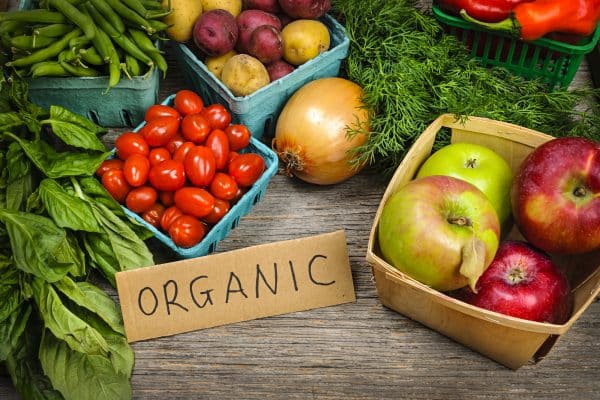With organic food sales going through the roof, is it actually better for you? If you Google it, it won't help! There are so many conflicting reports, it's impossible to come to a reasoned decision.
So what’s the real story?
Well if you look at the research, it’s a mixed bag. Some research is looking at nutrients in organic foods, and concluding that there’s really not much difference, although results are very mixed.
Some studies focus on the health outcomes of eating organic – generally these conclude that organic food eaters are more healthy – but again that could be just because they choose other healthy habits alongside eating organic.
But what most of these articles fail to really address is the danger of pesticides used on non organic produce. And that’s what I worry about the most. Nobody can argue that pesticides are safe for humans – there are literally thousands of studies saying the contrary.
The World Health Organisation have been saying for years that although individual pesticides are tested and deemed ‘safe', it’s the multiple exposure and bio-accumulation that has not been tested and could be harmful to health.
And when pesticides are used on fruit and veg, they are then transferred to animals eating grass and plants, so it goes up the food chain.
Pesticides are toxic by design – they kill insects, weeds, small animals or organisms that could threaten the plants they are designed to protect. But we humans also have microbes inside us, we host a whole ecosystem of living things – so what happens to that? There are very few studies on this yet, but I’m sure we’ll see links between these chemicals and our gut health.
Known pesticide risks;
- Abnormal growth and development in children
- Neurological dysfunction, including memory loss, brain fog, depression, anxiety
- Cancer
- Increased risk of infection
- Childhood cancer
A Hormone Disruptor
Many pesticides are known Endocrine Disrupting Chemicals, they can MIMIC, BLOCK or ALTER hormones (including oestrogen, progesterone, testosterone and thyroid). Here is what we know they can contribute to;
- Infertility & miscarriage
- Low sperm count
- Early puberty
- Hormone driven cancers
- Thyroid impairment
And what about if you’re going through menopausal changes? Our Oestrogen/Progesterone balance is crucial to how we feel, and with fluctuations during menopause, we don’t need anything else adding to the disruption!
So one thing is really clear for me, we don’t want to be over exposed to pesticides – which is why eating organic is one thing we can do. A study in Sweden measured pesticides in a family before and after switching to organic food. After 2 weeks on organic food, their levels reduced by 90%!
Organic food is generally more expensive and less available than non organic, so it’s not always easy to switch everything, and you don’t need to. My rule is that if you eat the skins or if it doesn’t have a skin, then try to buy organic, especially apples, berries, salad leaves, greens, etc.
In terms of meat, eggs and dairy – they have been found to be more nutritious than non organic forms, containing more omega 3 fats, which are essential for our hormones. For me personally, if I’m eating animal products, I want to eat the very best quality, and just have them a bit less often.
If you need help with your hormones, please Contact us for a Free Discovery Call to see how best we can help.
Sources;
Damstra T et al. Global assessment on the state of the science of endocrine disrupters. Health Perspect, 2001, 109:1175.
WHO Training for the Health Sector 2008; http://www.who.int/ceh/capacity/Pesticides.pdf
Human exposure to pesticides from food. A pilot study. For Coop Sverige AB. 2015

